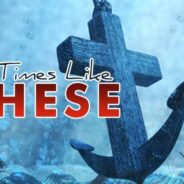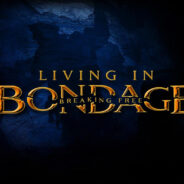Posted by Admin on 10:22 pm in Sunday School | Comments Off on THE BELIEVER’S STAND IN TIMES LIKE THIS, SEPTEMBER 8TH, 2024

CENTRAL THOUGHTChrist is the believer’s sure anchor. TEXT: ESTHER 3:1-6; 4:1-14. INTRODUCTION:As believers, we face a number of challenges that put a demand on our faith. These challenges may come to us in all areas of life- socially, politically, economically and spiritually, for which we must take a stand for Christ and be resolved to run the race to the end.Thus, in this study, “The believer’s stand in times like this” we shall be looking at the happenings around us and how a believer should respond to them. LESSON OBJECTIVESThe objectives of this study are to: Understand what “The believer’s stand in time like this means; Know the characteristics of the time we are living in; Discuss how some characters in the Bible stood in the time they lived in; Discuss how a believer should respond to the happenings in the time he/she lives in. BIBLE TRUTH:QUESTION 1) WHAT DO YOU UNDERSTAND BY THE PHRASE “THE BELIEVER’S STAND IN TIME LIKE THIS”.The believer in the context of this study refers to someone who believes in Christ Jesus. Such an individual must have accepted the Lord as his personal Lord and Savior; he/she is someone ready and willing to live his/her life in obedience to the word of the Lord.It is common knowledge that we live in hard times; the Bible calls it, ‘Perilous time’. It is the end time. It is therefore how the believer can go through these perilous times, keeping the faith without compromise that is under discussion.QUESTION 1B) DISCUSS THE CHARACTERISTICS OF THE TIME WE ARE LIVING IN.(i). Economically, Matt.24:7One of the characteristics of the end times, which is the time we live in, is financial hardship. The Bible clearly states that, there shall be famines, pestilences and earthquakes. This is scarcity of resources, food and basic necessities which is a cumulative effect from the kingdoms and the nations rising against themselves.As never before, the cost of living daily has become very expensive; availability and affordability of most basic needs now seem a luxury.The economic crunch/meltdown is not limited to our nation, it is global, and nations that were world economic powers have not been exempted.-(ii) Politically, Matt.24:6, 2 Tim 3:12The times we live in, have witnessed increase in wars and rumors of wars. Nations that had hither to be peaceful, are now involved in various forms of unrest. Also, there is increase in internal crisis and wars with a heightened local unrest. Insecurity of lives and properties is a challenge. All these should remind the believer that we are in the end times. A characteristic that also mark the end time is, the different forms of persecution the church is undergoing. It is indeed a perilous time.(iii) Socially, 2 Tim.3:1-4; Matt 24:7There is an increase in all the vices stated in the above passages; same sex marriage, self-centeredness, greed and covetousness, quest to make money at all costs, pride, worldliness and worldly standards, disobedience to parents, un-thankfulness and unholiness, ungodliness, inordinate affection, breaking of vows, false accusation, betrayal by loved ones, self-gratification.In Matt 24:7, the nations of the world shall equally rise against themselves and kingdoms against kingdoms, so there is also a global aspect of the social characteristics of the end times. It is a time witnessed by nations departing from blocks/unions for self-interest....
read more
Posted by Admin on 1:21 pm in Sunday School | Comments Off on Total Wellbeing-Divine Healing, SEPTEMBER 1ST, 2024

CENTRAL THOUGHTTotal Wellbeing is our inheritance in Christ. TEXT: EXODUS 15:26; DEUT.7:13-15; ISAIAH 53:3- 5; 3 JOHN 2. INTRODUCTION:A careful study of the scriptures will reveal that God’s original plan for man is for him to enjoy total wellbeing. Divine healing is God’s intervention where situations and challenges of life speak otherwise. We can boldly say that there is no healing without God’s intervention, whether through orthodox medicine, herbal medication or prayers. It is God’s prerogative to determine the method by whichan ailment could be healed. Some drugs are manufactured from herbs and God created the herbs and specifically said that some of them are for man’s healing. The scriptures contain numerous promises of God concerning healing and a wholesome life for man. Healing is part and parcel of the salvation package procured by our Lord Jesus for us on the cross. He borne our sickness when He died for our sins.In this study, we shall examine among other things how to appropriate God’s promises to bring about our healing and how to maintain a healthy lifestyle. LESSON OBJECTIVESTo Know: How sickness entered the world. That it is God’s will for us to receive healing. The condition that should be met before we can receive divine healing. The hinderances to receive divine healing. How to appropriate God’s promises to us for divine healing and remain in health. BIBLE TRUTH: QUESTION 1) HOW DID SICKNESS ENTER THE WORLD? GEN.2:17, 3:5-10; ROM.5:12; JN.5:14; LUKE.13:11-16; ACTS.10:38; MARK 1:23; 9:25.God made man in His own image and likeness and placed him in the garden of Eden to dress and keep it. He instructed man not to eat the fruit of a particular tree in the garden because the day he eats of the fruit he will die. However, man could not keep the commandment and ate of the fruit and ‘died’. Through this disobedience, man became subject to the manipulation of the devil of which sicknesses and diseases are by products. So, sickness and suffering are the product of curses God placed on man as a result of sin against God. QUESTION 2) IS IT GOD’S WILL FOR US TO BE HEALED AND BE IN GOOD HEALTH? DISCUSS: EXOD.15:26; DEUT.7:13-15; MARK 16:17-19; JAMES 5:13-15; PS.103:3-5; 3 JOHN 2.Yes, it is God’s will for us to be healed and be in good health during our sojourn here on earth. This is obvious because, at the point He placed the curse on man, He also put in place a plan not only to heal man from the sickness that would emerge as a result of the curses, but a perpetual remedy to the effect of the sin against Him (God). (Gen.3:15). In addition, He declared in His word, that He is our healer. He cannot lie, so He is willing at all times to heal and keep us in good health. (Exod. 15:26; Ps.103:3; Jer.30:17). QUESTION 3) WHAT CONDITION SHOULD BELIEVERS MEET TO BE HEALED? PS.66:18; MARK 9:23; 11:24; JN.15:7; ROM.12:1; EXOD.15:26.Healing is a part of the package in the salvation Christ procured for us on the cross with his blood. Therefore, the first condition a believer should meet to qualify for divine healing is to ensure that he/she is born again (has received Jesus Christ into his/her heart as Lord and personal Savior), thereafter,...
read more
Posted by Admin on 9:07 am in Sunday School | Comments Off on RETURN TO FIRST LOVE – PART 2 ,AUGUST 25TH, 2024

CENTRAL THOUGHT Return, ye backsliding children to the LORD. TEXT: REV. 2:1-7 INTRODUCTION: Backsliding can happen to any unsuspecting and unguarded Christian. It might not be outright return into sin, but according to Gal. 3, whenever the believer stops depending on the Holy Spirit to relying on flesh, such an individual is sliding back (i.e backsliding). God is not interested in the death of the sinner/ backsliding, so if such an individual repents, he shall have the Lord’s pardon and surely live. LESSON OBJECTIVES 1. To know what is backsliding 2. The identify the things that cause backsliding and possible remedies 3. To consider our attitude to backsliders 4. To examine how the backslider can return to his first love. BIBLE TRUTH: QUESTION 1) WHAT IS BACKSLIDING? Rev. 2:4-5; Prov. 14:14; Gal. 3:1-4; Ezek. 18:20-28, 33:11-16 The word backslide means to turn back or turn away. In scriptures, it means turning away from God, from our first love or from the gospel, unto satan, evil, or the world. It is turning back from following God and returning to the life and things of the world. It may not occur suddenly, but it is gradually over a period of time (1 King 11:9-10; Rev. 2:14; Gal. 1:6-7, 3:1-5; 1 Tim. 5:15; Ps. 125:5; 2 Tim. 4:10).The amplified Bible version puts Rev. 2:4b “… that you have left (abandoned) the love that you had at first”. You have deserted your first love. Backsliding by this scripture means deserting Christ by turning aside from His ways and instructions. God instructed the Israelites that they must keep His commandments and must not turn to the left or to the right (Deut. 5:22, 17:20). Prov. 14:14 says that backsliding is from the heart. The backslider in heart shall be filled with the fruit of his own ways and a good man shall be satisfied with the fruit of his ways (with the holy thoughts and actions which his heart prompts and in which he delights) (Amplified version). The implication of this is that backsliding is only evidenced by men and becomes obvious to men, after it had already taken place in the heart i.e backsliding starts from the heart before it becomes manifest by actions. The emphasis here is the heart. To be satisfied, one’s heart must be right with God and not in a state of backsliding. The nature of backsliding includes turning aside from God and from fearing God. Whenever an individual begins to compromise in his/her fear for God, it indicates the onset/outset of backsliding.In Gal. 3:1-4, the Galatian church was reproved for starting in the spirit and attempting to gain perfection by dependence on the flesh. Though this church started well as spiritual people they veered off to depending on the flesh. It tells us that backsliding is a state that the believer must watch against. It is not enough that one is saved today, backsliding comes in carious subtle ways, hence the warning in 1 Cor. 10:12 that he who thinks he stands should take heed i.e we should be on guard against falling. Being saved is different from having titles in church. (Ezekiel 18:20-28, 33: 11-16) Ezekiel vividly told us the dangers of backsliding. Verse 24b “… all his righteousness that he hath done shall not be mentioned:...
read more
Posted by Admin on 11:34 pm in Sunday School | Comments Off on RETURN TO YOUR FIRST LOVE – PART 1, August 18th, 2024

CENTRAL THOUGHT Believers should continue in their first Love. TEXT: REV. 2:1-7 INTRODUCTION: It is expected that at the point of giving one’s life to the Lord and accepting Him as personal Lord and Savior, there is a total turnaround in the life of an individual. To most believers, as should be to all, the newfound love and Lord becomes the center of their lives. This drives them with commitment to live, please, and do His biddings. The resulting effect is manifested in the individual’s commitment, dedication, and faithfulness to the Lord. The zeal is subject to dwindle and wane with time.The church at Ephesus started very well. They kept the Christian standard and were zealous for the work of God. However, a time came when they failed to love God above every other thing. They were admonished to return to their first love. In this study, we shall examine very closely this church vis-à-vis our lives with a view to derive some lessons. LESSON OBJECTIVES 1. To know the meaning of the words ‘ first love’ 2. To discuss the marks of a believer who has left his first love 3. To appreciate the possible hope of returning to one’s first love 4. To discuss the implications of not returning to our first love BIBLE TRUTH: QUESTION 1) WHAT DO YOU UNDERSTAND BY THE WORDS “FIRST LOVE”? Rev. 2:2-3, 4; Jer. 2:1-3 The words ‘first love’ connotes the very beginning, starting point, the initial commitment, dedication, faithfulness, and joy that an individual had at the point of giving one’s life to the Lord. There is usually great zeal towards God and the things of God. This drives the individual to be totally and completely sold out to the Lord and His service. There is a desire to please God above all odds, even at the risk of being ostracized, rejected, and called names for this newfound way (The love of God). There is a deep hunger to know God, hence, such an individual is not forced/ compelled to attend Christian meetings and activities but finds great joy and delight in being in the presence of God. In the pursuit of knowing God, such an individual studies and searches the scriptures for himself, prays and holds his relationship and fellowship with God at a high esteem. Such an individual’s life is in consonance with the word of God. In this state, such an individual does not partake in condole/ tolerate sin, but promptly rebukes it. QUESTION 2) WHAT WAS THE CHURCH AT EPHESUS COMMENDED FOR? Rev. 2:2-3 In Rev. 2:2-3, the Lord Jesus said, “I know thy works, and thy labour, and thy patience, and how thou canst not bear them which are evil: and thou hast tried them which say they are apostles, and are not, and hast found them liars:And hast borne, and hast patience, and for my name’s sake hast laboured, and hast not fainted.” The church at Ephesus was commended first for their works, i.e they were not lazy brethren but were busy for the kingdom. Amplified version described their efforts as laborious toil and troubles, which imply that their works and deeds were not trouble-free, i.e even amid their troubles, they worked laboriously for God. They endured patiently in their labor and were not...
read more
Posted by Admin on 9:25 pm in Sunday School | Comments Off on BEING ABOUT MY FATHER’S BUSINESS, AUGUST 11th, 2024
CENTRAL THOUGHTSoul wining is the Father’s business in which all believers have a share. TEXT: LUKE 2:49; 10:1-11; JOHN 9:4; MARK 16:15-18 INTRODUCTION:“And he said unto them, How is it that ye sought me? wist ye not that I must be about my Father’s business?” (Luke 2:49). From the Scriptures, these are the first recorded words spoken by the Lord Jesus Christ. From the onset, He made it abundantly clear that He was here on a mission- to do His Father’s business. From the first opportunity that presented itself, He launched Himself into this task. One may be tempted to ask- what is this business of the Fatherthat was such a consuming passion in His life? It was to bring the message of the gospel to the world; the good news of God reconciling the world to Himself by thesacrificial and substitution death of His Son; to enlist men and women into this business and leave it as a perpetual commission to all who come to believe the message of the gospel. Therefore, as those who have come to embrace the love of God demonstrated in the gospel, we need to see the task of reaching others for God not only as our duty but see it as the Lord Jesus did- it is our Father’s business. LESSON OBJECTIVES To know what the Father’s business is To understand the urgency of the business To know the requirement of effective evangelism To identify what constitutes the evangelistic message To appreciate the consequences of not evangelizing. BIBLE TRUTH:QUESTION 1) WHAT IS THE FATHER’S BUSINESS?The Father’s business is the business of evangelizing to the world; it is a world alienated from God by sin- the original sin and the present continuing acts of men which offend God. It is the task of making men understand that as Romans 3:23 says, none is exempted “For all have sinned and come short of the glory of God”. All have sinned andso all have need of God’s forgiveness. The good news is that by Christ’s death, pardon for sin has been purchased.All who repent and believe in this finished work of grace have their sins remitted and are reconciled to God. Having accomplished salvation by His death, the Lord Jesus has left us the business of telling others, so that being reconciled they may escape eternal judgement and damnation awaiting all those who spurn at God’s offer. QUESTION 2) WHY IS EVANGELISM AN URGENTBUSINESS?From the Lord’s handling of this matter, it is obvious that it was a very urgent business. In John 4:34 He said to the disciples, “My meat is to do the will of Him that sent me and to finish His work”. To the Lord, nothing else mattered, the first reason for this passionate disposition was that the harvest was already ripe and plenteous (Matt. 9:36-37; John 4:35-38). The harvest was already ripe and therefore must be brought in to avoid waste and loss. Just as God is interested in the souls of men for salvation, so also is the devil but with the aim of bringing them into destruction. That is why we must get them to obtain abundant life in Christ (John 10:10). Secondly, the harvest is plenteous. There is much to be done and so there is no time...
read more
Posted by Admin on 9:10 pm in Sunday School | Comments Off on DELIVERED, YET IN BONDAGE, AUGUST 4TH, 2024

CENTRAL THOUGHT My people are destroyed for lack of knowledge. TEXT: GALATIANS 3:1-6, 5:1-5; EXODUS 32:7-6INTRODUCTION:It is a great accomplishment to obtain liberty for oneself orfor another but is greater task to sustain the principles andprocess of that liberty. This scenario is more apt in theChristian race where at repentance; we are delivered fromthe darkness of sin and Satan and brought into themarvelous light of Christ’s gospel. What have we donewith this state of liberty? The tendency to drift into anotherform of bondage is high, through the conflicts and fusion ofthe old and new lives.There are very many practical trends in todays’ Church thatare clear evidences of bondage among believers. Theymanifest in lifestyles, self –imposed taboos and very poorunderstanding of the divine privileges associated withsalvation.This study is aimed at identifying the various forms ofbondage plaguing believers today and to proffer solutionsout of such captivity. LESSON OBJECTIVES To explain how one can be delivered and yet be in bondage. To identify the causes of bondage after deliverance. To discuss some biblical examples of people that were delivered andyet in bondage. To identify practices among believers that are evidences of bondage. To examine how we may truly remain delivered from bondage. BIBLE TRUTH:QUESTION 1) DISCUSS THE PHRASE ‘DELIVERED, YET IN BONDAGE’.In the context of this study, to deliver means to liberate, orto set free from any form of oppression, barrier, obstacle;while bondage refers to a state of servitude, captivity orsubjugation by a force. It means to be restricted inliberty. The two concepts deliver, and bondage arecontrary to each other.In the context of salvation in Christ, we are grafted into thefamily of God when we express faith in Jesus Christ andfollow it up with repentance. We are thus delivered. Fromthis state of liberty, it is possible to gradually slide backinto the same type of entanglement or with another form ofbondage. In this situation, our practical lives will notmatch the expectations of the kingdom. Such an individualwill still be under the oppressive influence of sin, and hisChristian growth will be retarded. Service will beineffective and living the Christian life (i.e. Christ-like life)becomes burdensome. The desire for the pleasures of theold lifestyle begins to reawaken. QUESTION 2) WHAT ARE THE CAUSES OF BONDAGE AFTER DELIVERANCE? Proverbs 4:23; Hosea 4:6 The general cause of bondage after deliverance is spiritual carelessness, and poor discernment. This is seen in manifest ignorance of the word of God, giving birth to impatience, greed, incomplete surrender, ungodly association, inadequate discipleship training, and outright disobedience.Other causes are carnality and lust, pride of life and excessive desire for material accomplishment. Others are doctrinal crossbreeding through allegiance to multiple fellowships and numerous prophets. QUESTION 3) ARE THERE SCRIPTURAL INSTANCES OF PEOPLE WHO WERE DELIVERED, BUT STILL EXPERIENCED BONDAGE? Exodus 32:7-9, Galatians 3:1-3 There are some examples where people who were delivered by God, had to slide back to bondage. The Israelites were delivered from bondage in Egypt by the strong arm of God through Moses. But with every challenge, they openly manifested the nature of Egypt. They soon forgot their slavery and craved for the pot flesh of Egypt. This became a hindrance and many of them perished without getting to the Promise Land.The Galatian Church is another example. It didn’t take long, after they were saved by grace, for them to return...
read more
Posted by Admin on 10:51 am in Sunday School | Comments Off on PRAYING ALWAYS, JULY 28TH, 2024

CENTRAL THOUGHT Prayer is a powerful weapon to fight spiritual war. TEXT: EPHESIANS 6:18-20; 1 TIMOTHY 2:1-4INTRODUCTION:Prayer is a line of communication between man and his Maker, the Almighty God. For the believer, it should be a lifestyle and a habit. It is an attitude of waiting on the Lord until the answer comes. It is a place of stability, fellowship, conversation, partnership, etc. where the believer receivesstrength, learns holiness and obedience. It is very vital for Christian living. In prayer, we draw closer to God. Full consecration comes through prayer.Prayer is part of the Christian’s armor andinstrument/weapon of war. Through prayers, kingdoms are subdued. Prayer, as a spiritual weapon, is both defensive and offensive.This study is aimed at helping us to recognize that men ought always to pray and not to faint. LESSON OBJECTIVES To know what prayer is Appreciate how prayer is an armor and how to use it effectively. Know the hindrances to answer to prayers. Understand what the believer should pray about BIBLE TRUTH: QUESTION 1) WHAT IS PRAYER? Prayer is the line of communication between man and his Maker, the Almighty God, in the form of thanksgiving, appreciation of God’s past works, supplication, request or intercession. It is a time of asking, listening, and hearing from God. Prayer is an act of worship. It enhances every other activity in one’s relationship with God. It is an offensive weapon to fight against the powers of darkness. The power to pray grows gradually with the help of the Holy Ghost. QUESTION 2) HOW IS PRAYER AN ARMOR? Prayer is an armor (a spiritual armor) because it connects the believer with the power of God and attracts the attention of heaven for answers to be released. Prayer brings us into communion with God who knows the strategy of the enemy for each battle. In the place of prayers, the enemy’s strategy/ stronghold and strength are revealed to the believer and this will enable him/her to know how to fight each battle. King Hezekiah was threatened by King Sennacherib; he prayed, and God gave him victory over his enemy (2 Kings 19:14-19, 32-37). Prayer as a weapon of our warfare is mighty through God for pulling down of strongholds (2 Corin. 10:3-5). Prayer also strengthens and keeps us alert spiritually. QUESTION 3) WHAT SHOULD THE BELIEVER PRAY ABOUT? Scriptures enjoin us that prayers be made for: a. All men to be saved (1 Timothy 2:1)b. For kings and all that are in authority to rule honestly and in the fear of God (1 Timothy 2:2) c. For all Christian leaders to be led by the Holy Spirit (Eph. 6:19) d. That all believers may be effective in doing the work of God (Matt. 9;37,38; 5:16)e. Our enemies (Matt. 5:44) f. Ourselves, amongst others (Matt. 6:9-14) We must depend on the Holy Spirit to reveal to us daily what we must pray for. QUESTION 4) WHAT ARE THE HINDRANCES TO ANSWER TO PRAYERS? There is no prayer that God does not answer unless it is not according to His will/word, or the believer is not attentive to hear from Him. The answer can be yes, no, or wait, depending on God’s purpose for His children. The hindrance to prayers can be: a. Sin: Sin is the major hindrance to...
read more
Posted by Admin on 10:52 am in Sunday School | Comments Off on THE AWE IN WORSHIP, JULY 21ST, 2024

CENTRAL THOUGHT True worship leads to righteous living and righteous living enriches congregational worship. Hymn: “Oh Worship the King” TEXT: ISAIAH 6:1-5, JOHN 4:19-34, 2 CHRONICLES 5:1-14 INTRODUCTION: God Almighty, the Creator of the universe and everything therein and His only begotten Son, Jesus Christ, who redeemed mankind from death, destruction, deserve our praise, thanks, honor, adoration and worship. We can do nothing without Him because He is our source. After creating the heavens and the earth, God created man in His image and likeness to live in comfort and enjoy His creation and reciprocate by serving and worshiping Him all the days of his life. When man sinned and became separated from God, He sent His only begotten Son to redeem him from death and destruction. For these reasons every living soul ought to serve and worship the Almighty God for His goodness, loving kindness and mercy. True worship arises from a heart that is fully or totally yielded unto God, which begins with the acceptance of the Lord Jesus Christ as Lord and personal Savior and is reflected in total obedience to the will of the Almighty.As believers we must acknowledge that we are privileged to be partakers of God’s divine grace, as made available in our Lord and Savior Jesus Christ. In response to His divine grace, we must approach Him reverently, in faith and humility, yielding our Spirit, Soul and body unto Him without any reservation. The believer must also live in constant consciousness of the constant presence of the Almighty. This will enable him or her to faithfully live for Him and not soil his or her life with sin.Conclusively, it is not enough to worship but there is also need for the believer to stand in awe of Him. LESSON OBJECTIVES 1. To explain the meaning of worship. 2. To identify who to worship. 3. To know how to worship. 4. To understand what is meant by making a joyful noise unto the Lord. 5. To know the hindrances to worship BIBLE TRUTH: QUESTION 1) WHAT IS WORSHIP?In Great Illustrated Dictionary, ‘worship’ is defined as the reverent love and allegiance accorded a deity; ardent devotion; adoration.The Christians worship the Almighty God who made the heavens and earth, and everything therein. Through God we live, move and have our being. By God, our redemption was made possible through Jesus Christ, His only begotten Son who told us not to fear since He holds the keys of hell and death. Hence with gladness we solicit for God’s divine presence through worship as He is our comforter, defender, provider, healer, etc. Also, God promised that He would be with us always even till the end of the world.In worship, we make a joyful noise unto the Lord with singing, praises and thanksgiving, proclaiming His good and mighty works. As revealed in the “Lord prayer” in Matthew 6:9-10, we hallow God’s name through worship as done in heaven. The angels and the twenty-four elders do not rest day and night in heaven, glorifying, honoring and thanking God, Revelation 4:9-11. Worship is total surrender to God of our all, appreciating and giving Him credit for everything we have or have achieved since wecan do nothing without Him, 2 Chronicles 5:11-14; Psalm 100:1-5. QUESTION 2) WHO SHOULD WE WORSHIP?...
read more
Posted by Admin on 10:41 pm in Sunday School | Comments Off on HINDRANCES TO PRAYER, JULY 14TH, 2024

CENTRAL THOUGHTSinful living constitutes a major hindrance to prayer. TEXT: ISA. 59:1-2; JAMES 4:1-10 INTRODUCTION:It is God’s desire, as it is our desire when we pray, that we receive answers to our prayers. God said, “call upon me in the day of troubles: I will deliver thee, and thou shalt glorify me.” (Psalm 50:15).Occasionally we are hindered from praying and even when we pray, answers to our prayers may be hindered. The reason is that Satan knows that when we go to God in prayer, we obtain strength to prevail against him. Therefore, he does all he can to hinder us from paying. It is not that God is not able to fulfil His promise to answer our prayer, but our iniquities, which Satan plunges into us, separates between us and our God, and our sins hide His face from us that He would not hear. Satan therefore causes us to sin to affect our separation from God.In this study, those things that may bring about hindrances to our prayers would be examined, and ways in which those hindrances can be overcome are suggested. LESSON OBJECTIVES To know what hindrances to prayer imply To know some of the things the enemy (Satan) may use to hinder us from praying. To know how to overcome those hindrances. BIBLE TRUTH: QUESTION 1) WHAT DOES IT MEAN TO HINDER?The word hinder according to the dictionary means to keep back, to stop, or prevent, to be an obstacle. According to an elementary dictionary, the word hinder simply means, get in the way of someone or something.“Hindrance to prayer” therefore implies the act of stopping prayer or that which keeps back prayers, or prevention to prayer, or obstacle to prayers, or on the other hand, person or thing that gets in one’s way to prayer.Hindrance to prayer can be described as physical speed breaks which are usually built on our roads, to pose obstacle to the free flow of traffic. It does not allow one to maintain a particular speed level. Hindrances to prayer would not allow one to maintain an upward prayer life. Answers to prayers could also be hindered through delays that may be engineered by the devil which God may allow to benefit the Christian. (Daniel 10:12-14; Rom. 8:28). QUESTION 2). WHAT ARE SOME OF THE THINGS THE ENEMY (SATAN) MAY USE TO HINDER US FROM PRAYING? Lk. 21:34Nothing troubles Satan, our enemy, like the prayers of the Saints. Therefore, he tries all his possible best to stop or hinder the Saints from praying. Some of the things the enemy uses to hinder us from praying are stated in Luke 21:34. “And take heed to yourselves, lest at any time your hearts be overcharged with surfeiting and drunkenness, and cares of this life, and so that day come upon you unawares.”First from this passage is surfeiting. Anything of this flesh is capable of hindering us from praying. As the Bible puts it “Love not the world, neither the things that are in the world, the lust of the flesh, and the lust of the eyes, and the pride of life, is not of the Father.” (1 John 2:15-17). The love of the world which is associated with these three elements, the lust of the flesh, the lust of the eyes and...
read more
Posted by Admin on 11:15 pm in Sunday School | Comments Off on SOME CAUTIONS ABOUT PRAYERS, JULY 7TH, 2024

CENTRAL THOUGHTPrayers must conform with the word of God, as led by the Holy Spirit. TEXT: JAMES 4:3; LUKE 9:51-56; MATT. 6:5-13 INTRODUCTION:Prayer as we all know it is a veritable mode of communication between us believers and our Heavenly Father. Christ emphasized the need for and importance of prayer “that men ought always to pray and not faint” (Luke 18:1b).Therefore, for every Christian, prayer is indispensable. However, prayer has become one Christian practice that has been misused and abused by many in recent times. Many people in a bid to receive “quick answers” to their prayers have been led into error. Some so-called prayer leaders have devised many teachings and doctrines on prayer which are contrary to the Word of God. Some of these have led to unwholesome practices that tend towards occultism and fetish. It must be emphasized that any form of prayer outside that as was taught by Jesus Christ is unacceptable by God and can never attract His attention. LESSON OBJECTIVES To explain what Christ cautioned against as Christians pray; Highlight and discuss what time of the days were prayers made by people in the Scriptures; Identify where each of these prayers took place; and Explain some prayer practices, including how scriptural they are. BIBLE TRUTH: QUESTION 1) WHAT WAS IT THAT CHRIST CAUTIONED AGAINST AS CHRSITIANS PRAY? (Matt. 6:5-7)Jesus Christ cautioned against outward show as Christians pray. He said “and when thou prayest, thou shalt not be as the hypocrites are: for they love to pray standing in the synagogues and in the corners of the streets, that they may be seen of men. Verily I say unto you, they have their reward” (Matt. 6:5). He also cautioned against vain repetition, for such persons “think that they shall be heard for their much speaking.” Prayer should be genuine and sincere from the heart. It should not be to impress people, rather it is pouring our hearts to God and expressing our sincere love and dependence on His love and mercy.QUESTION 2) WHAT TIME OF THE DAY DID PRAYERS IN THE FOLLOWING SCRIPTURES TAKE PLACE? (Mk. 1:35; Matt. 26:36-39; Luke 5:12,16; 6:12; Acts 3:1)There is no specific time of the day that prayers cannot take place. Jesus rose early in the morning, a great while before day and departed into a solitary place to pray. Jesus also prayed in the night before His arrest. Jesus was a man of prayer, he prayed during the day and at other times all through the night. “Peter and John went together into the temple at the hour of prayer, being the ninth hour.” The ninth hour in this context was stated as 3 o’clock in the afternoon. From all these references, it then follows that there is no specific time that prayer cannot take place. We are enjoined in the Scriptures to “pray without ceasing: (1 Thess. 5:17). Paul also admonished the Ephesian brethren in Eph. 6:18 this: “Praying always with all prayer and supplication in the Spirit…” In summary, prayer can take place at any time be it morning, noon, afternoon, evening, or night. Out God “neither sleeps nor slumbers”. His ears are attentive to our prayers at all times. QUESTION 3). IDENTIFY WHERE EACH OF THESE PRAYERS TOOK PLACEMatt. 14:23; Luke 18:10; Acts 10:9,30,11:15Just as prayers...
read more








